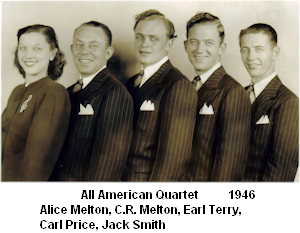 |
Group MembersTenor |
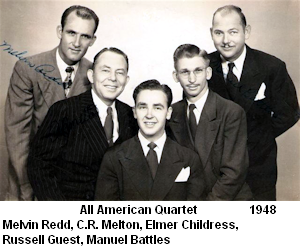 |
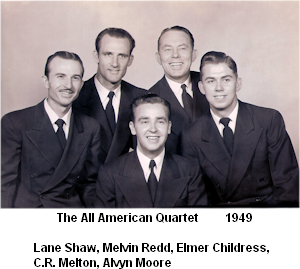 |
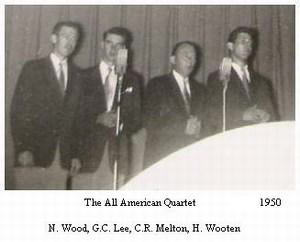 |
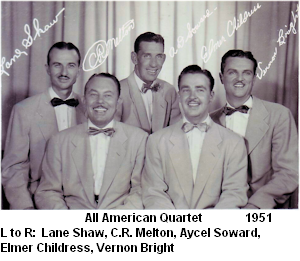 |
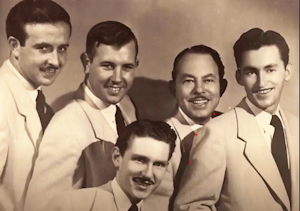 All American Quartet - 1952 |
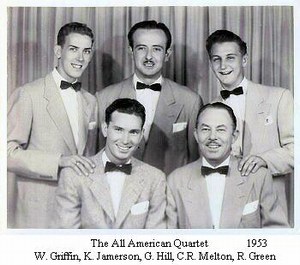 |
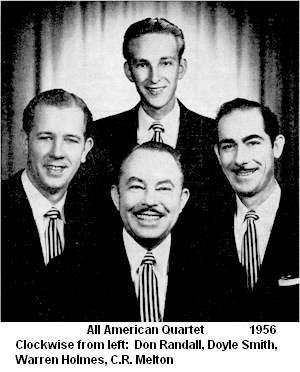 |
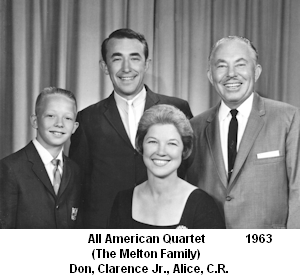 |
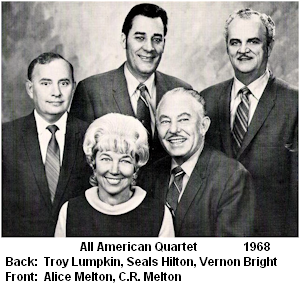 |
The All American Quartet (1946-1956; 1958-1970)
(Contributors to this article: Larry Baker, Elmer Childress, Ralph Green, Gordon Hill, Seals Hilton, George C. Lee, Don Melton, Doyle Smith, and Dave Terry)
History
The All American Quartet was a gospel singing group organized in Oak Ridge, Tennessee in 1946 by Clarence “C. R.” Melton who had worked at one of the sites where the government was developing the atomic bomb until the project ended in September of 1945. The group was perhaps best known for the sheer volume of turnover in personnel, which included many well-known singers and musicians.
Their sound was basic four part harmony without emphasis on flashy arrangements and showmanship. C.R. Melton served as the quartet's manager, emcee and baritone. Accompaniment was typically limited to the piano, but the accordion was included from time to time. C.R. Melton's wife, Alice, was skilled at playing both instruments and played for the quartet for periods of time throughout the quartet's existence. She also sang the alto part from time to time.
Many other quartets offered opportunities for those wanting to sing, but it often came with substantial variation in income from week to week. C.R. Melton offered a modest, but relatively stable pay. The All American Quartet was for the most part a full-time group. Its members didn't generally have to hold down other jobs, a practice which was often the case with some other quartets. Still, the lure of better opportunities resulted in frequent turnover for the All American Quartet.
Members during the first year were Earl Terry, tenor; Carl “Willie” Price, lead; C.R. Melton, baritone; Jack Smith, bass; and Alice Melton on piano and accordion. Before the end of 1946, Price and Smith had left, and the quartet had moved to Knoxville. Although he was not a member of the quartet, Erman Slater is thought to have filled in at various parts with the All American Quartet during their time in Knoxville.
By January, 1947, Bob Crews was hired to sing lead and nineteen-year-old Gordon Hill came from the Jacksonville (AL) Harmony Boys to sing bass. Jimi Hall was the quartet's pianist. Before they left on a tour tour that extended to the West coast, Jimi Hall resigned.
While they were in California, Earl Terry left the quartet. Alice Melton filled in at alto for the remainder of the tour. Before Terry left, the quartet cut its first three records at the Sacred Records studio in Hollywood, California. On the homeward leg of the same tour in Gadsden, Alabama, Gordon Hill left the quartet and returned to sing with the Jacksonville Harmony Boys. He went on to join Hovie Lister and the Statesmen in 1948 as their original bass singer. Bob Crews left not long after Hill. He later became a member of the Harmoneers. After the loss of Terry, Hill, and Crews, the quartet was reorganized in the fall of 1947 in Gadsden, Alabama where they appeared for several months on WGAD radio. While in Gadsden, they were joined by future Rangers Quartet and SMGA Hall of Fame member Erman Slater.
In September, 1948 pianist Elmer Childress, tenor Russell Guest, lead Melvin Redd, and bass Manuel Battles left the Home State Quartet from Little Rock, Arkansas to join with C.R. Melton to re-form the All American Quartet in Carbondale, Illinois. Carbondale was the former home of Herschel Foshee and his Stamps-Baxter Quartet before they moved to Little Rock in 1947. Guest and Redd had been members of Foshee's group in Carbondale. The new All American Quartet joined radio station WCIL and also had monthly singings at the high school in Centralia, Illinois. After a while, the quartet left Carbondale and moved to Mt. Vernon, Illinois.
Manuel Battles left near the end of 1948. He was replaced by Alvyn Moore, a smooth-sounding young bass from Mississippi. Russell Guest left in early 1949 and was replaced by Lane Shaw, who had been a member of the Melody Masters. A number of records were made on the Sacred label during 1949.
In early 1950, when Alvyn Moore left to continue his college education, Hershel Wooten joined the All American Quartet. This was his first professional singing job. Around this time Lane Shaw left, and Norman Wood came on to fill the tenor slot.
Elmer Childress soon left to join Don Smith and the Gospelaires in Fresno, California. He was replaced at piano by Wayne Griffin. Lead singer Melvin Redd left, and in May, 1950, George C. Lee was hired to sing lead after James Blackwood recommended him to C.R. Melton.
At that time, the group consisted of Norman Wood, tenor; George C. Lee, lead; C.R. Melton, baritone; Hershel Wooten, bass; and Wayne Griffin on piano. This group sang on WMIX in Mt. Vernon, Illinois at 6:15 AM and 1:00 PM Mondays through Fridays. During this time period, they often sang at concerts in churches and small civic centers or auditoriums within driving distance. When their concerts required them to travel too far to return in time for their broadcast, they pre-recorded their program using a “wire recorder” which used a thin steel wire as the recording medium. The wire recorder soon gave way to the sixteen-inch radio transcription disks which were distributed to multiple radio stations. All five members traveled in C.R.'s auto carrying along sound equipment, boxes of 78 RPM records, songbooks and their personal items.
Hershel Wooten, George Lee, and Norman Wood left in August of 1950. Within a few months, Hershel joined Bobby Strickland and the Crusaders.
Manuel Battles returned to the bass position. Veteran tenor Vernon Bright replaced Norman Wood. Former tenor Lane Shaw came to sing lead, replacing George C. Lee. Both Bright and Shaw had sung together with Jake Hess, James Wetherington, and Wally Varner in the Melody Masters Quartet in Lincoln, Nebraska. Elmer Childress also returned at piano.
In early 1951, Battles left and was replaced by former Statesmen bass, Aycel Soward. The lineup at the time was Vernon Bright, Lane Shaw, C.R. Melton, Soward, and Childress. By late 1951 Doyle Smith had been hired to sing tenor, replacing Vernon Bright, Lane Shaw had left, and Calvin Newton had come to fill in at lead for a short time. Elmer Childress had left to join the Stamps Quartet in Dallas, Texas. Wayne Griffin returned at piano.
In February, 1952, the All American Quartet moved to Decatur, Illinois. Don Randall came on to sing lead, Gordon Hill returned to his old bass slot, and Easmon Napier came on at piano. The quartet made a trip to South Carolina and heard Bill Shaw singing in a quartet. In a short time Doyle Smith was “let go” and replaced by Bill Shaw. About six months later James Blackwood heard Bill singing with the All American Quartet at the High School in Centralia, Illinois and asked him to join the Blackwood Brothers.
When Bill Shaw left, he was replaced by their former tenor, Vernon Bright. By the end of 1952 Easmon Napier had moved on to the Stamps Quartet and Doyce Thompson had become the pianist.
Around March, 1953, Earl Terry, who had sung with several quartets including the Statesmen, the LeFevres, and Lee Roy Abernathy’s Miracle Men since leaving the All American Quartet, returned to sing tenor. C. R. Melton had to be away from the quartet for extended periods, so Vernon Bright stayed on to sing baritone or lead as needed. Bright also handled the emcee duties when C.R. was away.
By the late fall of 1953 Earl Terry, Don Randall, Vernon Bright had left the quartet and were replaced by Kermit Jamerson at tenor and Ralph Green at lead. C.R. Melton returned as the full time baritone and emcee. Doyce Thompson was replaced by Wayne Griffin. Gordon Hill remained at bass.Before the end of 1953 Kermit Jamerson left and was replaced by Doyle Smith who had been their tenor two years earlier.
During early 1954, C.R. Melton moved the quartet from Decatur to Quincy, Illinois. The All American Quartet consisted of Doyle Smith, tenor; Ralph Green, lead; C.R. Melton, baritone; Gordon Hill at bass; and Phil Drake at piano. They played daily on both WTAD radio and WGEM TV. They didn’t make any recordings. Phil Drake left in May, 1954. At that time tenor Doyle Smith took over piano while still holding down the tenor slot. Ralph Green also left in 1954 and was replaced by Rayton Worthy on lead.
Gordon Hill left in late 1954 and joined the Revelaires Quartet in Atlanta, Georgia. Gordon was replaced by Lanny Bowman at bass. In 1955 Lanny Bowman left and was replaced by Gordon Hill in his third time with the quartet. At that time the quartet consisted of Doyle Smith, tenor and piano; Rayton Worthy, lead; C.R. Melton, baritone, and Gordon Hill, bass. Later in 1955, Rayton Worthy and Gordon Hill left and were replaced by Don Randall singing lead and bass singer Warren Holmes who had sung with the Blackwood Gospel Quartet, an offshoot of the Blackwood Brothers. The quartet maintained that lineup consistently until they disbanded in June, 1956, which was probably the longest time the group had gone without a personnel change.
By 1958, a version of the All American Quartet again existed in Quincy. It consisted of the former members Vernon Bright, tenor; Rayton Worthy, lead; C.R.. Melton, baritone; and Lanny Bowman, bass. The pianist was Don Mooney, who had been with Jim Hamill and the Watchmen Quartet in Des Moines, Iowa. The lineup remained in place until mid-1959. They did not make any recordings.
In 1961 the All American Quartet became a family group consisting of C.R. and Alice Melton and their two sons, Clarence Jr. singing lead and Donald (beginning around eleven years old) at bass. Part of the appeal of the family quartet was the little boy bass singer. At each performance he would try to go down and hit the low note in "Hide Me Rock Of Ages." They would slow the song down during that part, and as he tried to go down for that note, they'd act like they were seriously listening to hear if he was going to reach it (and he’d always pause briefly before singing the low note.) They were seen regularly on WGEM TV in Quincy, Illinois and on KTVO, which served Southeastern Iowa and Northeastern Missouri. This lineup made the quartet’s only LP album.
During the late 1960s, the members of the quartet included Alice Melton, alto and piano; Vernon Bright, lead; C.R. Melton, baritone; and the famous bass, Seals “Low Note” Hilton. Hilton was the veteran bass who had spent many years with the Harmoneers Quartet. Troy Lumpkin was hired to sing tenor for a short time. The quartet disbanded in 1970.
Most of the quartet's early recordings were 78 RPMs on the Sacred Records label. Later, many of their recordings were on the All American Quartet Records label. The All American Quartet was the first quartet to record Stuart Hamblen’s song "This Ole House" in 1954. Their best selling record was AAQR 1205 with "Wanna Rest" and "Peace In The Valley." One other interesting note is that Elvis Presley's manager, "Colonel" Tom Parker, approached C.R. Melton early in Elvis's career to ask whether the All American Quartet would be interested in serving as the backup singing group for Elvis. C.R. Melton is reported to have told Parker that the All American Quartet was a gospel quartet and they were not interested.
Discography
1947 (Sacred Records SS-503): If We Never Meet Again; Don't You Let Nobody Turn You Around. (Earl Terry, Bob Crews, C.R. Melton, Gordon Hill, Alice Melton) (same songs released as Sacred Records J-146).
1947 (Sacred Records SS-504): Looking For A City; Keep Your Eyes Upon The Cross. (Earl Terry, Bob Crews, C.R. Melton, Gordon Hill, Alice Melton).
1947 (Sacred Records SS-505): Jesus Fills My Every Need; I'm Just A Stranger Here. (Earl Terry, Bob Crews, C.R. Melton, Gordon Hill, Alice Melton) (same songs released as Sacred Records J-148).
1948 (Sacred Records SS-529): Wonderful Time Up There; Twilight Time. (Russell Guest, Melvin Redd, C.R. Melton, Manuel Battles, Elmer Childress).
1948 (Sacred Records SS-530): Riding The Range For Jesus; New Born Feeling. (Russell Guest, Melvin Redd, C.R. Melton, Manuel Battles, Elmer Childress).
1948 (Sacred Records SS-531): Sweet Chariot Swing; Everybody Ought To Know Something About My Lord. (Russell Guest, Melvin Redd, C.R. Melton, Manuel Battles, Elmer Childress).
194? (Sacred Records SS-532): When He Calls Me; I’m Just Checking Up On My Payments To The Lord.
1949 (Sacred Records SS-533): Just A Closer Walk With Thee; I’ve Got That Old Time Religion. (Russell Guest, Melvin Redd, C.R. Melton, Alvyn Moore, Elmer Childress).
1949 (Sacred Records SS-534): Build Me A Cabin In The Corner Of Glory Land; Lord Save Thy People. (Russell Guest, Melvin Redd, C.R. Melton, Alvyn Moore, Elmer Childress).
1949 (Sacred Records SS-535): Meet Me Up In Heaven; Well Done My Child.
1949 (Sacred Records SS-536): You Can't Believe Everything You Hear; If Heaven's Any Better. (Lane Shaw, Melvin Redd, C.R. Melton, Alvyn Moore, Elmer Childress).
1949 (Sacred Records SS-537): Where Could I Go But To The Lord; Hallelujah Spiritual. (Lane Shaw, Melvin Redd, C.R. Melton, Alvyn Moore, Elmer Childress)( Side A Re-released in Compilation “Close Harmony” on CD by Dualtone Records).
1949 (Sacred Records SS-541): Whispering Hope; Lead Me Gently Home Father. (Lane Shaw, Melvin Redd, C.R. Melton, Alvyn Moore, Elmer Childress).
1949 (All American Quartet Records 542): Over The Moon; He’ll Understand And Say Well Done. (Lane Shaw, Melvin Redd, C.R. Melton, Alvyn Moore, Elmer Childress).
1949 (Sacred Records SS-543): Hallelujah Song; When God Dips His Pen Of Love In My Heart. (Lane Shaw, Melvin Redd, C.R. Melton, Alvyn Moore, Elmer Childress).
1950 (All American Quartet Records 1100): Land Where Living Waters Flow; Swing Down Chariot. (Norman Wood, George C. Lee, C.R. Melton, Hershel Wooten, Wayne Griffin).
1950 (All American Quartet Records 1101): Wait Till You See Me In My New Home; You Sho Do Need Him Now. (Side A--Vernon Bright, George C. Lee, C.R. Melton, Alvyn Moore, Wayne Griffin; Side B—recorded with two different lineups)
195? (All American Quartet Records 1201): Roll On Jordan; Far Above The Starry Sky. (Vernon Bright, Lane Shaw, C.R. Melton, Manuel Battles, Elmer Childress).
195? (All American Quartet Records 1202): The Prettiest Flowers; I'm Free Again. (Vernon Bright, Lane Shaw, C.R. Melton, Manuel Battles, Elmer Childress).
1951 (All American Quartet Records 1203): Marching Up To Heaven; If You Never Learned To Pray. (Vernon Bright, Lane Shaw, C.R. Melton, Manuel Battles, Elmer Childress).
1951 (All American Quartet Records 1204: Old Time Preacher Man; I’ve Got A Wonderful Feeling. (Vernon Bright, Lane Shaw, C.R. Melton, Manuel Battles, Elmer Childress).
1951 (All American Quartet Records 1205): Peace In The Valley; Wanna Rest. (Vernon Bright, Lane Shaw, C.R. Melton, Manuel Battles, Elmer Childress).
1951 (All American Quartet Records 1206): Hide Me Rock Of Ages; I Couldn't Hear Nobody Pray. (Vernon Bright, Lane Shaw, C.R. Melton, Manuel Battles, Elmer Childress).
1951 (All American Quartet Records 1207): It Is No Secret; Led Out Of Bondage. (Vernon Bright, Lane Shaw, C.R. Melton, Manuel Battles, Elmer Childress).
1951 (All American Quartet Records 1208): Looking For A City; Lead Me To That Rock. (Vernon Bright, Lane Shaw, C.R. Melton, Manuel Battles, Elmer Childress).
1951 (All American Quartet Records 1209): Rolling, Riding, Rocking; Just A Rose Will Do. (Vernon Bright, Lane Shaw, C.R. Melton, Aycel Soward, Elmer Childress).
1951 (All American Quartet Records 1210): Land Of Perfect Day; A Beautiful Life. (Vernon Bright, Lane Shaw, C.R. Melton, Aycel Soward, Elmer Childress).
1951 (All American Quartet Records 1211): Going Home; Medley Of Song. (Vernon Bright, Lane Shaw, C.R. Melton, Aycel Soward, Elmer Childress).
1952 (All American Quartet Records 1212): He Bought My Soul At Calvary; I'm Working On A Building. (Doyle Smith, Don Randall, C. R. Melton, Gordon Hill, Easmon Napier).
1952 (All American Quartet Records 1213): I’ll Leave It All Behind; Happy Rhythm. (Doyle Smith, Don Randall, C. R. Melton, Gordon Hill, Easmon Napier).
1952 (All American Quartet Records 1214): I Could Hang My Head In Shame; Search Me Lord. (Doyle Smith, Don Randall, C. R. Melton, Gordon Hill, Easmon Napier).
1952 (All American Quartet Records 1215): Way Out Yonder; My Journey To The Sky. (Doyle Smith, Don Randall, C. R. Melton, Gordon Hill, Easmon Napier).
1952 (All American Quartet Records 1216): I’m Bound For The Kingdom; On The Jericho Road. (Doyle Smith, Don Randall, C. R. Melton, Gordon Hill, Easmon Napier).
1952 (All American Quartet Records 1217): I’ve Been To Heaven In A Dream; The Love Of God. (Bill Shaw, Don Randall, C.R. Melton, Gordon Hill, Easmon Napier).
1952 (All American Quartet Records 1218): Satisfied; Paradise Island. (Bill Shaw, Don Randall, C. R. Melton, Gordon Hill, Easmon Napier) (also in 45 RPM).
1952 (All American Quartet Records 1219): Peace Like A River; Is He Satisfied. (Bill Shaw, Don Randall, C. R. Melton, Gordon Hill, Easmon Napier) (also in 45 RPM).
1952 (All American Quartet Records 1220): You Need His Hand; The Joy Of Heaven. (Bill Shaw, Don Randall, C. R. Melton, Gordon Hill, Easmon Napier).
1953 (All American Quartet Records 1221): My God Is Real; Talk About Jesus. (Thought to be Don Randall, Vernon Bright, C.R. Melton, Gordon Hill, Doyce Thompson).
1953 (All American Quartet Records 1222): Joy To The World; We Three Kings. (Thought to be Earl Terry, Don Randall, Vernon Bright, C.R. Melton, Gordon Hill, Doyce Thompson).
1953 (All American Quartet Records 1223): The First Noel; It Came Upon A Midnight Clear. (Thought to be Earl Terry, Don Randall, Vernon Bright, C.R. Melton, Gordon Hill, Doyce Thompson).
1953 (All American Quartet Records 1224): Hark The Herald Angels Sing; O Come All Ye Faithful. (Thought to be Earl Terry, Don Randall, Vernon Bright, C.R. Melton, Gordon Hill, Doyce Thompson).
1953 (All American Quartet Records 1225): Silent Night; O Little Town Of Bethlehem. (Thought to be Earl Terry, Don Randall, Vernon Bright, C.R. Melton, Gordon Hill, Doyce Thompson).
1953 (All American Quartet Records 1226): In The Sweet Forever; He Will Never Leave Me. (Thought to be Earl Terry, Don Randall, Vernon Bright, C.R. Melton, Gordon Hill, Doyce Thompson).
1953 (All American Quartet Records 1227): Mansion Over The Hilltop; Sing Brother Sing. (Thought to be Earl Terry, Don Randall, Vernon Bright, C.R. Melton, Gordon Hill, Doyce Thompson).
1954 (All American Quartet Records 1228): This Old House; In My Father's House. (Doyle Smith, Rayton Worthy, C.R. Melton, Gordon Hill).
1954 (All American Quartet Records 1229): The Bible Tells Me So; Take My Hand. (Doyle Smith, Rayton Worthy, C.R. Melton, Gordon Hill).
1954 (Custom Records AA 1001 and AA 1002): This Old House; In My Father's House; Heavenly Love; The Man Upstairs. (Doyle Smith, Rayton Worthy, C.R. Melton, Gordon Hill). (45 RPM-EP and 78 RPM-EP).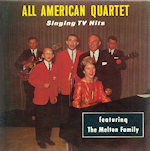 hi-res
hi-res
1963 All American Quartet Singing TV Hits (All American Quartet Records/ LP 1471-14175 and 14176): Don’t Let Nobody Turn You Around; I Can’t See Him, But I Know He’s There; Goodbye World, Goodbye; My God Is Real; It’s Different Now; What A Friend We Have In Jesus; Hide Me Rock Of Ages; This Old House; Wings Of A Dove; Gabriel, Blow Your Trumpet; Led By The Master’s Hand; Old Time Preacher Man; Whispering Hope; I Can Call Jesus Any Time. (Alice Melton, Clarence Melton, Jr., C. R. Melton, Donald Melton, Kenny Hayes, Paul Hoots).
1969 (All American Quartet Records 700303): Oh My Heart Is Still Rejoicing; How Great Thou Art; I Am His And He Is Mine; Tell My Friends. (Troy Lumpkin, Vernon Bright, C.R. Melton, Seals Hilton, Alice Melton) (45 RPM- EP).
